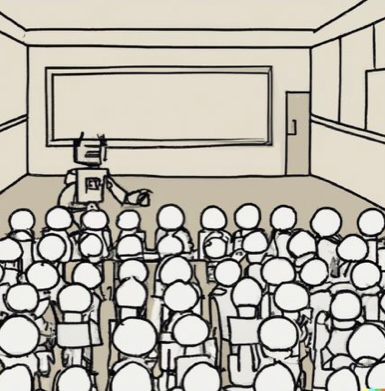Opinion: The Problem With AI

Credit: Dall-e Open AI
March 15, 2023
The rise of artificial intelligence (AI) refers to the increasing development and adoption of technologies that can perform tasks that typically require human intelligence, such as learning, problem-solving, decision-making, and pattern recognition.
AI has been a subject of research and development for decades, but recently, the usage of AI has increased greatly, which has led to further progress in the field. Artificial intelligence technologies are now being used in a wide range of industries, including healthcare, finance, transportation, manufacturing, and more.
Artificial intelligence has the potential to revolutionize many aspects of our lives, from the way we work and communicate to the way we learn, but it also poses new challenges, such as ethical concerns around the use of AI and the potential impact on jobs and society as a whole. As AI continues to evolve, we can expect to see even more innovative applications and use cases in the future. However, it’s important to ensure that the development of AI technologies are guided by ethical and responsible principles to maximize the benefits and minimize the risks.
Although there are many practical and beneficial applications of artificial intelligence, as it becomes more accessible, students are beginning to take advantage of it. It undermines the educational process and does not allow students to develop the critical thinking and problem-solving skills that are essential for their future success.
AI can provide answers and solutions to problems efficiently, but that discourages students from engaging in critical thinking and problem-solving activities on their own. AI may limit students’ exposure to diverse perspectives and approaches to problem-solving, which may lead to a narrow understanding of a particular topic.
In a school setting, artificial intelligence would not be able to capture the full complexity of certain subjects, such as literature, art, and history, which require more distinctive interpretations and analyses.
For example, in literature, understanding the symbolism and themes of a novel requires a deep understanding of the human experience and emotions, which may be difficult for AI to capture. Similarly, in art, the interpretation of a painting or sculpture may depend on cultural and historical contexts that may not be fully understood by an AI algorithm.
Therefore, it is important to recognize the limitations of AI and use it as a tool to enhance, rather than replace, the expertise of human teachers and experts in these complex subjects. This means that, while AI can be used to provide insights and analyses based on data, it should not be relied upon to replace human judgment and expertise in the interpretation of complex subjects.
In general, AI can perpetuate biases and discrimination if the data used to train the algorithms is not diverse and representative of all students. AI algorithms learn from historical data and if the data is biased, then the algorithm will reflect those biases. For example, if an AI algorithm is used to predict which students will succeed in a particular class, and the historical data used to train the algorithm shows that certain demographic groups have historically performed poorly in that class, the algorithm may end up discriminating against those groups.
This is a present issue not only in classrooms, but in all parts of modern society. AI brings up ethical issues because it involves the creation of machines and systems that can make decisions and take actions without direct human intervention. These systems may have the ability to analyze vast amounts of data and make predictions, recommendations, or even decisions based on that data.
Although AI can definitely serve an important purpose in parts of the professional world, it does not have a place in a school setting. Not only is it cheating, but it undermines the educational process and doesn’t allow for students to learn to think deeply for themselves. Artificial intelligence as an idea in general brings up many ethical issues and as the technology advances, it is crucial that the possible limitations are considered with the benefits.












